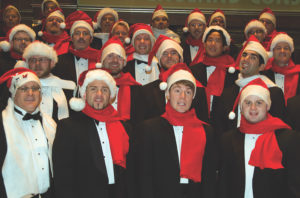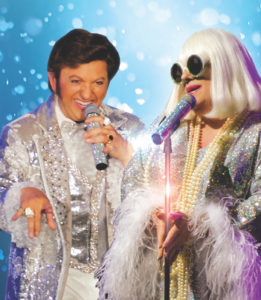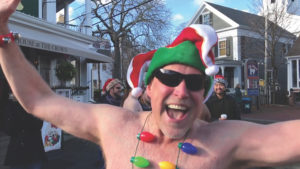For three hours every Wednesday evening, Reuben Reynolds, the music director of the Boston Gay Men’s Chorus (BGMC), leads more than 300 members in song. A self-described “mean queen” at the front of the group, fierce about memorization, he’s conducted the chorus for 27 years.
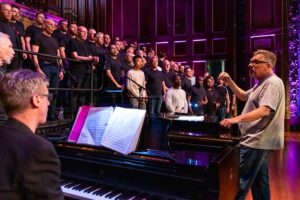
Reynolds graduated from Shorter College in Rome, Ga. with a degree in economics. “That was not for me,” he says. He immediately went back to school at Louisiana State University for his master’s in music and the UMKC Conservatory for his doctorate. He then spent seven years in Kansas City as the music director of the Heartland Men’s Chorus.
When he was offered the job in Boston in 1997, he and his husband, Bill Casey — a college sweetheart who died in 2021 at age 58 — decided to make the move. “The arts are so vibrant here,” he says. And in front of the BGMC, Reynolds could “combine my two loves: music and social activism.”
The group puts on six performances around the holidays plus two in March and three in June. The music ranges from classical to modern, traditional folk songs to pop hits. They’ve been performing a holiday show in Provincetown since the first Holly Folly in 1997 — and they’ll be back on Saturday, Dec. 2 for this year’s iteration, “Green & Gleeful.”
“We figured out a long time ago,” says Reynolds, “that this is the holiday celebration for a lot of people. A lot of people go to Christmas Eve services. Then there are people who come to the Boston Gay Men’s Chorus, and they bring their entire office staff.” Every year, the same group of women, decked out in Christmas gear, grab the front row.
For members, the chorus is not just an artistic endeavor but a social hub. Retreats, like one to Ogunquit, Maine in the fall, braid rehearsal with collective fun. “People meet and get married,” says Reynolds. One chorus couple in their 70s met 10 years ago after one of them had come out later in life.
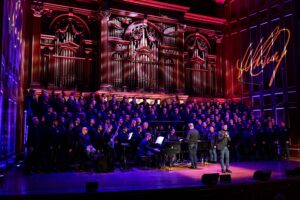
Gary Jackson, originally from St. Louis, has been with the chorus for just over five years. He serves as cochair of the chorus’s social committee. “For me,” says Jackson, “the chorus means family.” Members range from undergraduate students to retirees. During the day, they are lawyers, artists, teachers, doctors. But music is a unifying force, Jackson says.
At auditions, Reynolds asks prospective choristers to tell him about themselves: “Whatever you want to tell me,” he’ll say. They don’t need to be accomplished musicians — although the chorus certainly has them. They just need to be able to read music and have a voice that blends.
At the beginning, says Reynolds, he chose music by thinking of the “great pieces of choral literature for men’s voices.” Then he realized it wasn’t about that at all. “It’s about the stories we tell and how people relate to those stories,” he says. “We want to sing about our lives.”
Last year, says Reynolds, they performed a piece they’d commissioned by the Broadway composer John Bucchino, based on Tyler Curry’s book A Peacock Among Pigeons. “It’s the story of a peacock raised by a flock of pigeons,” says Reynolds. “He realized he was different and tried to hide his colors by covering himself in mud. One day, when he looked into a puddle of water, he saw the most glorious bird he’d ever seen, full of colors. He realized that was him. That was who he was.”
The BGMC is part of GALA Choruses, a global LGBTQ association of about 250 gay and lesbian choruses. “We do conventions once a year,” Reynolds says, “where the music directors talk about how the music we are commissioning communicates our lives to the general public.”
The chorus has a history of breaking silence. First, says Reynolds, it existed to ask, “Can you stand on stage and be public as a gay person?” During the AIDS epidemic, he adds, the group “created a family for each other while this horrible scourge was ravaging our community.” The very existence of the chorus was and still is a political statement: that the people it includes cannot and should not be ignored.
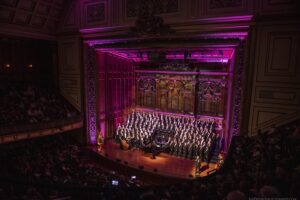
“We don’t try to change people’s perception of who we are,” he says. “We simply tell them about who we are and invite them into our lives.”
Jackson, who is Black, recalls when the chorus sang “Seven Last Words of the Unarmed,” a composition in seven movements by Joel Thompson. Each movement quotes the last words of a Black man before he was killed. The fourth movement — “I don’t have a gun. Stop shooting” — is about Michael Brown, who was shot and killed by police in Ferguson, Mo., a suburb of St. Louis. It was difficult, Jackson says, balancing education and entertainment. In the end, the chorus performed with deep respect and care.
“In that moment,” says Jackson, “I felt really connected to the chorus and knew that I had support.”
The first half of this year’s holiday concert in Provincetown is about “gorgeous singing,” according to Reynolds. The second part injects pizzazz into the show, with songs influenced by How the Grinch Stole Christmas. It’s “silliness and fun and dancing queens everywhere in costumes — just an incredible explosion of energy,” he says.
The show also includes carols based on traditional songs from Latin countries, sometimes switching from Spanish to English in the same song. “Then we’ll go to Nigeria for a while,” says Reynolds, performing a song written by a young member of the chorus, Innocent Okechukwu, who grew up in Nigeria learning music from missionaries.
Okechukwu earned his master’s degree from the Longy School of Music of Bard College in Cambridge, says Reynolds. Okechukwu, who was out on the internet as gay, couldn’t return to Nigeria, where homosexuality is illegal. He stayed in Massachusetts and joined the chorus.
“Knowing his story,” says Reynolds, “it’s wonderful seeing him in rehearsal each week, glowing because he can be open and honest about who he is. And we can sing his music openly.”
Honest Voices
The event: “Green & Gleeful” with the Boston Gay Men’s Chorus
The time: Saturday, Dec. 2, 8 p.m.
The place: Provincetown Town Hall, 260 Commercial St.
The cost: $55 to $100 at ptown.org
Editor’s note: An earlier version of this article, published in print on Nov. 30, misspelled the name of composer John Bucchino and erroneously gave the location of the chorus’s retreats as “Algonquin” instead of Ogunquit.

